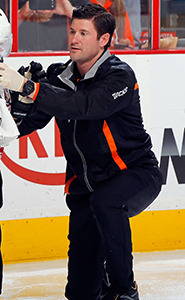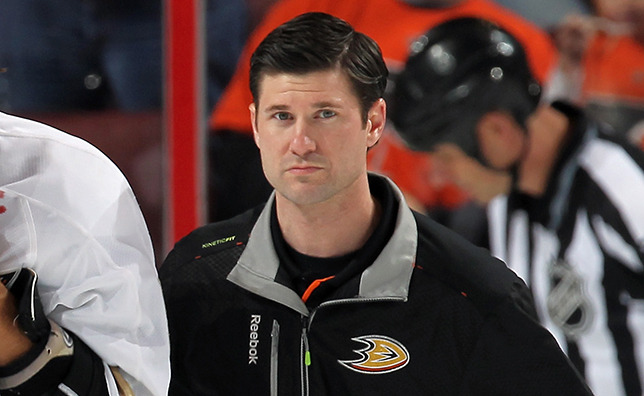
Joe Huff found himself at the 49th annual National Athletic Trainers Association convention in Baltimore, Md., in June of 1998. Just a month before, Huff had graduated from Iowa State with a bachelor’s degree in exercise and sports science.
On that June day, he scanned the job posting board at the convention and had to make a choice. He could apply for a job to be an athletic trainer in Georgia with the Macon Whoopee of the Central Hockey League, or head back to college for one more year and earn a master’s degree.
He applied for the job. He got it.
“I got my master’s in the school of hard knocks, traveling in bus leagues,” Huff said.
He started at one of the lower rungs of the hockey ladder, but just 15 years later, Huff climbed to the top as the head athletic trainer of the Anaheim Ducks of the NHL.
His first paid opportunity came in Macon, Ga., but his start in athletic training came at Iowa State. He began with the football and wrestling teams, but his passion jump-started when he joined Cyclone Hockey as an athletic trainer in 1996 before becoming the head trainer for Cyclone Hockey the next year.
“He was every bit a part of the team as anyone else on the team,” said former Cyclone Hockey defenseman Bob Dressel, who was on the team during Huff’s tenure. “We all practiced Monday through Thursday for two hours, we all traveled together and he was there every day with us from the first day of classes to the end of the season.”
Huff never suited up for the Cyclones, but he remembers many of the moments from the two seasons he was with the team. One of his fondest memories is Cyclone Hockey hosting the national championship tournament in 1998 at Hilton Coliseum. They finished third.
“It was a lot of work, but it was a lot of fun,” Huff said.
Huff’s statement still applies today as he works with professional hockey players within the Ducks’ organization. On many days, he puts in well over 12 hours, coming in at 7 a.m. and not leaving until after the game has finished.
The grind of his athletic training career has been taxing not only on himself but also on his family, which consists of his wife, who is from his same hometown of Marshalltown, Iowa, and two daughters, who are 13 and 10.
After Huff got his professional start in Macon, he moved back to his home state of Iowa to work as the head athletic trainer of the Des Moines Buccaneers. Huff moved his family back to Georgia six seasons later to work with the Augusta Lynx.
His move to the Lynx, Anaheim’s East Coast Hockey League affiliate, started his connection with the Ducks. He then moved to Anaheim’s American Hockey League Affiliate, the Iowa Chops.
Huff’s return to his home state didn’t last long, as the Ducks’ affiliation moved to Syracuse, N.Y., two years later. It moved again after another two years to Norfolk, Va., in 2012.
The head athletic trainer position opened with the Ducks in 2013. Since Huff had worked with all three levels of the organization, he was the ideal fit for Anaheim’s NHL team.
“I think when you graduate, you have the idea that [working in the NHL] would be great,” Huff said. “Working with professional hockey was what I thought would be really fun, but I don’t know if I ever consciously set that as the goal.”
Huff has averaged moving his family nearly every two years, living in seven different cities as an athletic trainer during the last 15 years. Nevertheless, Huff has found himself working in the NHL, but it hasn’t always been easy on him or his family.
“It’s a long and windy road,” Huff said. “It’s definitely not for the faint of heart and it takes an understanding, very supportive family.
“I am lucky in that aspect to say the least.”
Huff has been making sacrifices since he was a student living in Ames. Instead of being a part of the more glamourous sports such as football and basketball, he chose to be a part of Cyclone Hockey and that has helped him get to where he is today, doing something what most young athletic trainers only dream of: being the head athletic trainer of a professional sports team.
“[Cyclone Hockey] is not a varsity program. It’s not something where people go from there to the next level,” Dressel said. “And Joe did it.”


